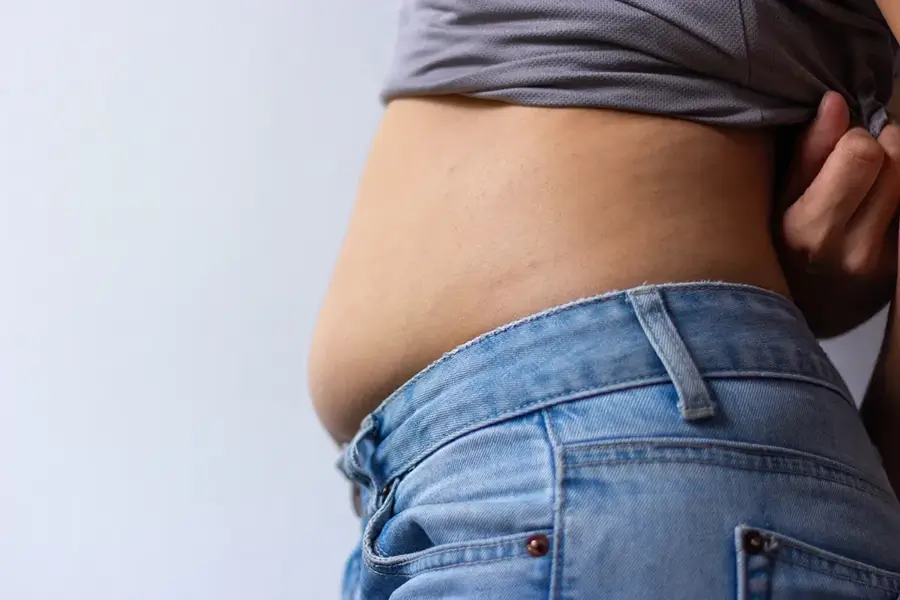Swollen Belly: Could It Be Fibroids?
A swollen belly can be a concerning symptom, and while many conditions can cause this discomfort, one often-overlooked culprit is uterine fibroids. These noncancerous growths in the uterus can lead to a range of symptoms, including abdominal bloating. We’ll explore the possibility of uterine fibroids causing a swollen belly, describe the sensation of bloating, and introduce an effective treatment option known as Uterine Fibroid Embolization (UFE) that can reduce or eliminate these symptoms.

Understanding the Causes of a Swollen Belly
A swollen or distended belly can result from various underlying causes, ranging from benign issues like overeating and gas to more serious medical conditions such as ovarian cysts, tumors, or uterine fibroids. When experiencing persistent abdominal swelling, it’s crucial to consult with a medical professional for a proper evaluation.
Uterine Fibroids and Abdominal Bloating
Uterine fibroids, also known as leiomyomas or myomas, are noncancerous growths that develop in or on the uterus. They can vary in size and number, causing a range of symptoms, one of which is abdominal bloating. Here’s how fibroids can lead to this uncomfortable sensation:
Increased Uterine Size: As fibroids grow, they can cause the uterus to expand, leading to a feeling of fullness and bloating in the lower abdomen.
Pressure on Surrounding Organs: Larger fibroids can exert pressure on neighboring organs, such as the bladder and intestines. This pressure can disrupt normal organ function and contribute to abdominal discomfort and bloating.
Gastrointestinal Symptoms: Fibroids can sometimes irritate the gastrointestinal tract, leading to symptoms like constipation, gas, and bloating.
The Sensation of Bloating
Bloating, often described as a feeling of fullness or tightness in the abdomen, can be uncomfortable and distressing. For individuals with fibroids, this sensation may be a recurring symptom that impacts their daily lives. Bloating can manifest as:
Swelling: The abdomen may appear visibly swollen, and clothing may feel tighter than usual.
Discomfort: Bloating can be accompanied by a sense of pressure or fullness in the lower abdomen, making it challenging to move comfortably.
Gas and Flatulence: Bloating is often accompanied by increased gas production and a need to pass gas more frequently.
Pain: Some individuals with fibroids may experience mild to moderate abdominal pain or cramping alongside bloating.
While bloating can result from various causes, including dietary factors, gastrointestinal issues, or hormonal fluctuations, it’s essential to consider uterine fibroids as a potential contributor, especially if other fibroid-related symptoms are present.
Uterine Fibroid Embolization (UFE)
If uterine fibroids are causing abdominal bloating and other discomforting symptoms, it’s important to explore treatment options. Uterine Fibroid Embolization (UFE) is a minimally invasive procedure that has emerged as a highly effective solution for managing fibroid-related symptoms.
Here’s how UFE works and how it can alleviate the bloating and other symptoms associated with fibroids:
Procedure Overview: UFE is a nonsurgical procedure performed by an interventional radiologist. It involves the use of a specialized catheter to deliver tiny particles to the blood vessels that supply the fibroids. These particles block the blood flow to the fibroids, causing them to shrink and die.
Symptom Relief: As fibroids shrink in response to UFE, the pressure they exert on surrounding organs is reduced. This can lead to significant relief from bloating and other symptoms, such as pelvic pain, heavy menstrual bleeding, and frequent urination.
Minimally Invasive: UFE is a minimally invasive procedure that typically requires only a small incision, and it is performed under local anesthesia. Patients typically experience less pain, a shorter recovery time, and a quicker return to normal activities compared to traditional surgical options.
Preservation of Uterus: UFE is a uterus-preserving treatment, making it an excellent choice for individuals who wish to retain their fertility or avoid a hysterectomy.
High Success Rate: UFE has a high success rate in alleviating fibroid symptoms, including bloating. Many patients experience long-term relief and improved quality of life.
Contact Us
If you’re experiencing a swollen belly and suspect that uterine fibroids may be the cause, it’s time to take action and seek professional help. At Preferred Fibroid, we specialize in the diagnosis and treatment of uterine fibroids. Our team of experienced medical professionals can evaluate your condition and discuss whether Uterine Fibroid Embolization (UFE) is the right solution for you.
Don’t let abdominal bloating and fibroid symptoms disrupt your life any longer. Contact us today to schedule a consultation and explore how UFE can provide the relief you need. Your journey to a bloat-free, comfortable life begins with a simple step—reaching out to us for expert guidance and care.
